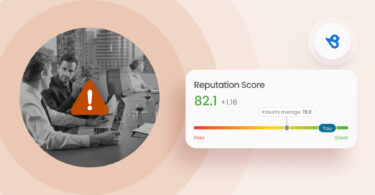Hotel review management helps hotels increase bookings, strengthen guest trust, and shape how travelers choose your property in competitive markets.
Summary
Successful hospitality review management in 2026 is built on timely responses, proactive engagement, and smart use of hotel review management software. Reviews now act as a digital front desk, influencing expectations and traveler decisions long before check-in. Hotels that streamline feedback and optimize visibility consistently improve their hotel reputation and drive stronger occupancy.
Modern hotel review management shapes first impressions the moment a guest searches your hotel online. Ratings and recent online reviews heavily influence booking choices, making every review an opportunity to stand out or lose a potential guest.
As travelers rely more on peer feedback, your reviews become the most public reflection of your service quality. Using advanced hotel review software like Birdeye helps hotels monitor sentiment, prevent negative experiences, and respond with consistency.
This blog covers how hotel leaders can master hospitality review management in 2026 by using the right tools and processes to protect reputation, engage guests, and convert reviews into higher revenue.
Table of contents
- What is hotel review management?
- Why responding to every review is non-negotiable
- How to respond to reviews with a hotel online review management for the company
- Should hotels respond to every review?
- 5 Hotel review management strategies (2026)
- Top tactics to avoid bad hotel reviews
- How Birdeye helped Palmetto Dunes deliver consistent, high-quality guest experiences across every location
- FAQs about hotel review management
- Final thoughts: A smarter approach to hotel review management
What is hotel review management?
Hotel review management is the structured approach of monitoring, analyzing, and responding to guest feedback posted on online review sites, including Google reviews, Birdeye, TripAdvisor, Expedia, Facebook, and OTA platforms. It also encompasses collecting new reviews, measuring guest sentiment, and acting on insights to improve the guest experience.
The goal? To actively shape your hotel’s online reputation and use it as a strategic lever to drive more bookings, earn loyalty, and position your hotel as a top choice in your area.
This is no longer a once-a-week task. In today’s real-time, feedback-driven environment, review management is continuous and requires both technology and strategy.
Why hotel reviews matter more than ever in 2026
Hotel reviews are a direct reflection of your hotel’s reputation, service quality, and ability to meet (or exceed) expectations. Here’s why managing reviews effectively is crucial for your hotel’s growth, visibility, and long-term success:
1. Guest reviews influence booking decisions
Modern travelers approach hotel bookings with the same diligence as major purchases—they read reviews, compare options, and base decisions on peer feedback. A single review, good or bad, can sway perception and determine whether a potential guest proceeds with a booking or clicks away.
As per Forrester 2024 reports, over two-thirds of US online adults use ratings and reviews to evaluate purchases, and over half check them for travel and dining experiences. This makes guest reviews one of the most powerful tools in a hotel’s conversion strategy.
Your online reviews serve as digital word-of-mouth. Each review contributes to the story guests tell about your property, making it vital to proactively manage your hotel’s reputation across review websites and social media platforms.
2. Reviews directly impact revenue and ADR
Your online reputation is tied not only to perception but also to profitability. Hotels with strong ratings often enjoy a clear competitive edge—both in terms of pricing power and occupancy. Industry data shows that a 1-star increase on the Yelp review platform can result in a 5–9% boost in revenue, with higher Average Daily Rates (ADR) and better conversion rates.
So, better reviews don’t just fill rooms; they also justify premium pricing and improve your hotel’s reputation.
3. Reviews build brand loyalty and guest retention
Every thoughtful response to a guest review signals that you’re listening and care. Acknowledging positive feedback reinforces great experiences, while respectfully addressing negative feedback creates an opportunity to win back trust.
Guests who feel heard are more likely to become repeat customers. They’ll refer your hotel to others, post positive reviews, and become part of your brand community. Emotional loyalty, built through proactive review engagement, is often more powerful than loyalty programs or discounts.
4. Reviews influence your online visibility
Review quantity, frequency, and responsiveness are key factors in local search engine rankings. Google, for example, uses review data as a signal to determine credibility and relevance. Hotels that consistently gather and respond to reviews often appear higher in local search results.
It leads to more impressions, clicks, and ultimately, more hotel bookings. By cultivating a steady flow of guest feedback and showing consistent engagement, your hotel will earn greater visibility and stay competitive in crowded markets.
Why responding to every review is non-negotiable
In a world where perception is shaped online, every review left unacknowledged is a missed opportunity, and every response is a chance to strengthen your hospitality business. Responding to hotel reviews, whether positive or critical, goes beyond mere courtesy. It is a strategic touchpoint with real business implications.
Here’s why responding to online reviews matters in hotel management service:
1. Builds guest trust
When you take the time to respond especially with personalization, it shows guests (and prospects) that your team values their input. This kind of care fosters trust, credibility, and confidence in your service.
2. Defuses negative feedback
A prompt, professional response to negative reviews can help de-escalate concerns before they influence others. Many dissatisfied guests are open to reconciliation when they feel heard and respected.
By addressing issues constructively, you not only protect your hotel’s reputation but also demonstrate operational accountability.
3. Motivates more feedback
Guests are more likely to leave reviews when they see hotel teams consistently responding to others. This creates a customer feedback loop that boosts review volume, enhances credibility, and signals that your hotel is committed to continuous improvement.
4. Boosts visibility through engagement
Online platforms reward active management. Review responses tell Google and other platforms that your business is engaged and relevant—factors that contribute to better rankings on online review sites and Google map listings.
In fact, Birdeye’s 2024 state of online reviews report highlights that hotels who consistently respond to their reviews see a measurable increase in both guest satisfaction and review frequency.
Your review responses are more than polite gestures; they are public declarations of your values, your responsiveness, and your service quality. When handled with care, they help you manage your hotel’s reputation and maintain guest relationships. It also drives long-term business success to your hotel’s location, both online and offline.
How to respond to reviews with a hotel online review management for the company
Some of the best ways to respond to hotel reviews are given below:
Responding to positive reviews
When a guest leaves positive review, it’s your chance to reinforce the relationship.
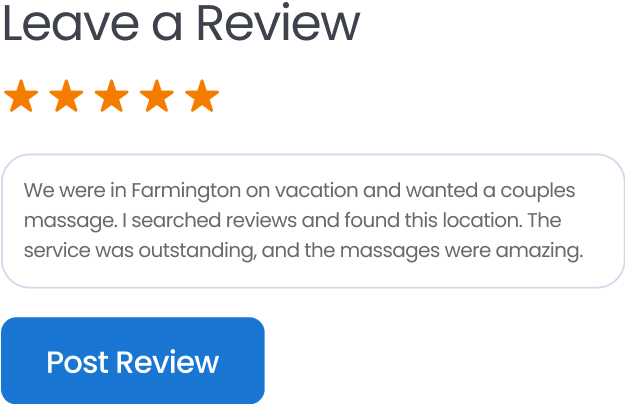
✅ Do:
- Thank them warmly
- Personalize the message using names or stay details
- Highlight any compliments in your response
- Invite them to return
Example:
“Hi James, thank you so much for your kind words! We’re thrilled to hear that our rooftop bar and ocean-view suite made your stay extra special. We can’t wait to host you again at Sunset Shores!”
Responding to negative reviews
Negative reviews can feel like a blow, but they’re also an opportunity to recover trust.
✅ Do:
- Acknowledge the issue without being defensive
- Apologize genuinely
- Offer a solution or invite the guest to discuss the matter offline
- Keep it professional
Example:
“Dear Rachel, we’re truly sorry to hear that your check-in experience was delayed. This is not the level of service we aim to provide. We’ve shared your comments with our front desk manager, and we would love to speak with you directly at guestcare@grandhaven.com to make things right.”
Should hotels respond to every review?
Yes, every review deserves a thoughtful response, no matter the tone or rating. In hospitality, every piece of feedback is a public window into your brand. Consistent responses show attentiveness, professionalism, and a genuine commitment to service excellence, which is the core of effective hotel review management.
A quick thank-you on a five-star review reinforces a guest’s positive experience. A calm, empathetic reply to a negative review can turn a disappointing stay into an opportunity for recovery. Strong hospitality review management does more than acknowledge feedback; it actively shapes perception and builds trust with future guests.
Review response activity also impacts visibility. Hotels that regularly engage with their reviews tend to rank higher in search results and review listings, especially when using modern hotel review management software to keep pace with growing guest feedback.
Guests notice this level of transparency. When they see that a hotel responds often and thoughtfully, it builds confidence long before they book. Over time, this consistent engagement helps improve the hotel’s reputation and strengthens loyalty.
To make this process easier for busy hotel teams, Birdeye offers tools that automate and elevate the entire workflow.
How to get more positive reviews at your hotel
A steady stream of positive guest reviews doesn’t happen by chance—it results from intentional effort, excellent service, and timely engagement. Here are four proven strategies to increase your volume of glowing reviews:
1. Ask at the right moment
Timing is everything. The best time to request a review is shortly after a guest has had a positive experience—during a smooth checkout, after a thoughtful interaction, or even while they’re still basking in the glow of an exceptional stay.
- Use Birdeye Reviews AI to automate these timely requests via SMS or email.
- Customize prompts based on service touchpoints to boost response rates.
2. Send post-stay guest surveys
Post-stay guest satisfaction surveys serve two purposes: they capture valuable guest feedback and act as a filter for negative sentiment. If a guest expresses dissatisfaction, you can resolve the issue privately—before it turns into a public review.
- Automate your survey distribution using integrated tools.
Pro tip: Hoteliers who use structured review management software and services like Birdeye’s Reviews AI can automate responses, gain insights, and improve guest experience at scale. With Birdeye’s Google API integration, guests post reviews in just a few clicks, simplifying feedback collection.
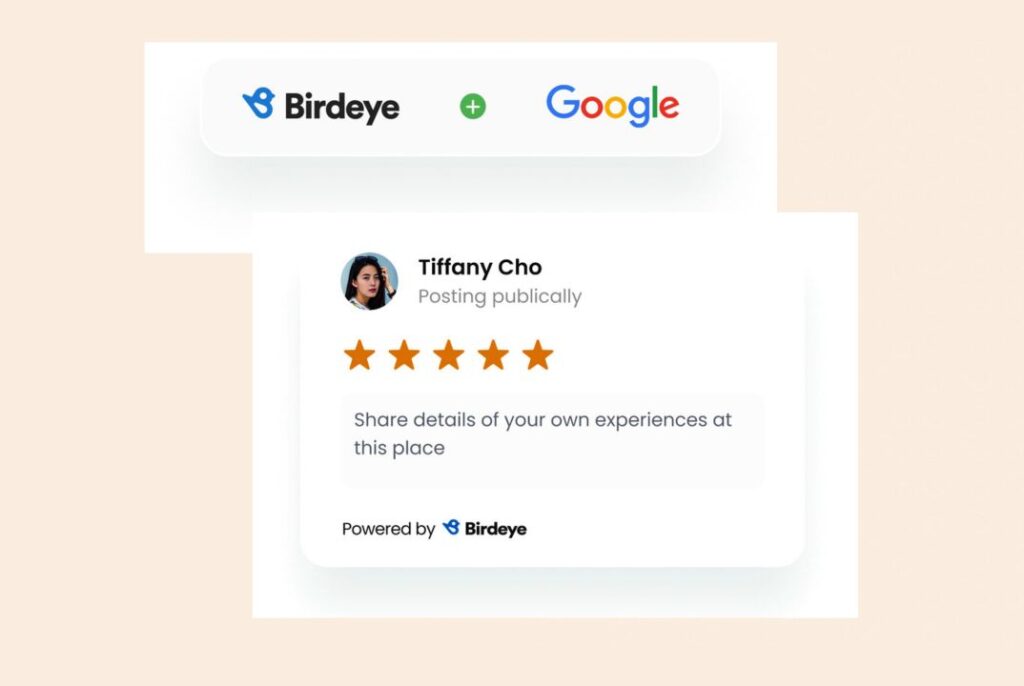
- Include a simple link at the end directing happy guests to review platforms like Google or TripAdvisor.
3. Encourage reviews during the stay
A gentle nudge can go a long way. Create subtle yet effective reminders for guests to leave a review.
- Use branded signage in common areas or QR codes in rooms.
- Train front desk staff to mention it at checkout in a friendly, non-pushy way.
- Follow up via email or text message within 24 hours after departure.
4. Deliver a memorable guest experience
Ultimately, the best way to inspire positive reviews is to exceed expectations. Personalized service, seamless operations, and thoughtful details stay with guests long after checkout.
- Use guest data from your PMS or CRM to tailor amenities, greetings, and recommendations.
- Surprise and delight your guests with small touches like handwritten notes or custom upgrades.
When your hotel delivers on the promise of comfort, quality, and care—positive feedback becomes a natural outcome.
5 Hotel review management strategies (2026)
Managing reviews efficiently requires more than just good intentions. It takes a solid operational framework supported by the right people and platforms. Here are some effective strategies on how to build a high-functioning hotel online review management system:
1. Assign dedicated ownership
Don’t leave review management to chance or spread it across untrained staff. Designate specific team members or partner with trusted hotel review management services like Birdeye to own the process.
- Ensure consistency in tone, language, and response timelines.
- Train your staff on best practices, brand voice, and escalation protocols.
2. Enable real-time notifications
Every hour counts when it comes to responding to guest feedback. Use software that delivers instant alerts when a review is posted, so you can reply promptly and proactively.
- With Birdeye’s centralized dashboard, multi-location hotels can monitor reviews and respond across multiple platforms from one place.
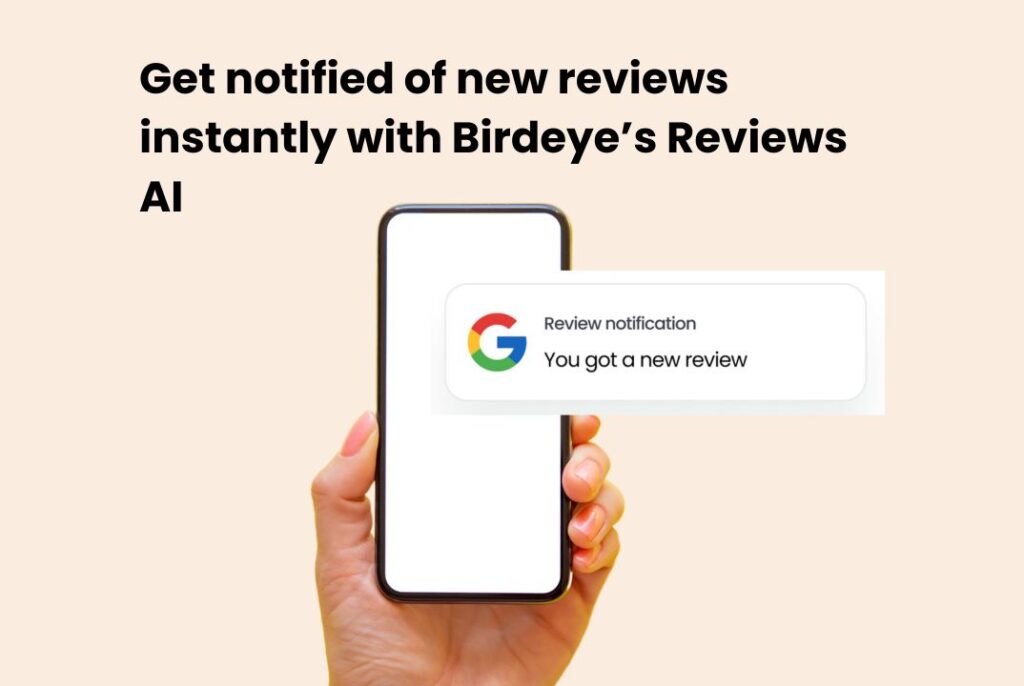
3. Respond with consistency and personalization
Templates can streamline your process, but avoid sounding robotic. Use the guest’s name, refer to specific details, and reflect your hotel’s tone of voice.
- Let Birdeye Reviews AI assist with smart, on-brand suggestions tailored to the sentiment and context of each review.
4. Avoid offering compensation publicly
While it may be tempting to appease a frustrated guest by offering discounts or freebies in your response, this can set a problematic precedent.
- Acknowledge the issue, express empathy, and invite the guest to continue the conversation offline.
- Handle resolutions privately, so your professionalism—not compensation—is the focus.
5. Use sentiment analysis and reporting tools
Don’t just manage reviews, analyze them. Leverage reputation management tools to uncover trends, identify service strengths and weaknesses, and generate review reports across properties.
- Tools like Birdeye Insights AI surface valuable guest sentiment insights at scale.
- Track KPIs such as response time, review volume, and satisfaction scores over time.
Use Birdeye Search AI to see how AI engines describe your hotel and where you appear in AI answers. It helps you spot gaps, strengthen visibility, and ensure customers get accurate, positive information across ChatGPT, Perplexity, and Gemini.
With the right setup, your hotel can turn review management into a measurable driver of both service quality and profitability.
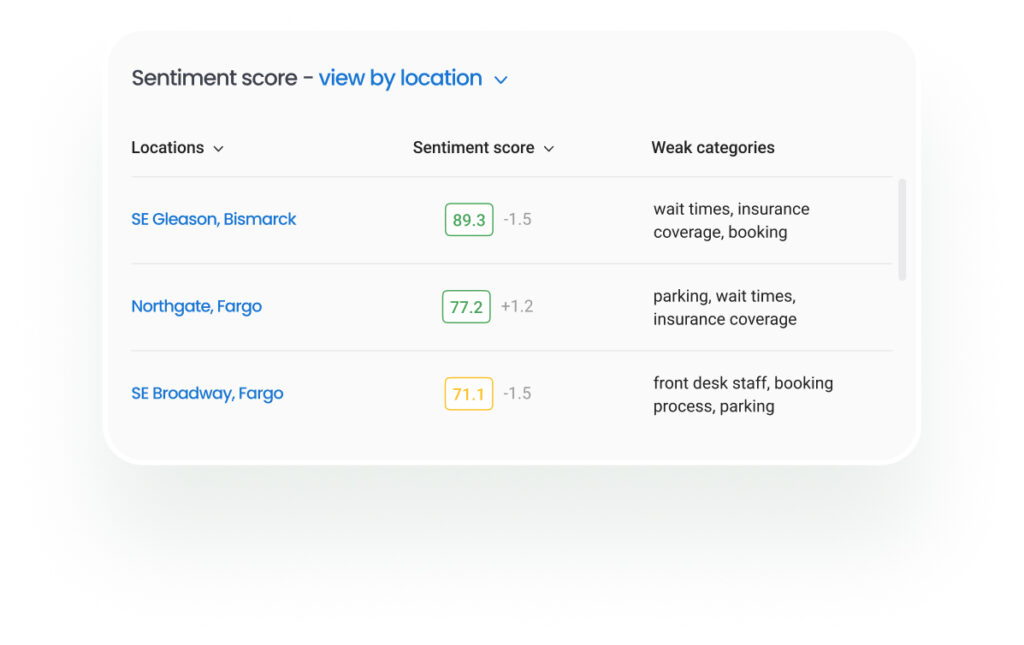
Top tactics to avoid bad hotel reviews
Preventing negative reviews is far easier (and cheaper) than repairing the damage they can cause. Prevention starts with a proactive, guest-centric approach throughout the entire stay.
1. Use the review feedback loop
Train staff to ask simple, open-ended questions like “How’s everything going with your stay?” These informal check-ins allow you to uncover and resolve issues early.
- Address concerns while the guest is still on-site.
- Empower employees to escalate problems quickly and discreetly.
2. Resolve complaints in real time
Real-time guest communication tools—like SMS or mobile messaging—allow guests to voice concerns without going public.
- Implement a direct line to the front desk or manager via app or QR code.
- Train staff to respond quickly and empathetically.
3. Send post-stay surveys before public reviews
Not every unhappy guest leaves a review, but many will complete a post-stay survey. Use this feedback channel to catch and address dissatisfaction privately.
- Set automated triggers to send surveys within 24 hours of checkout.
- Use branching logic to collect more context if a guest leaves negative responses.
- Harness Birdeye Surveys AI to capture deeper guest insights and turn responses into clear themes and action items. Also, the Birdeye Template Design Agent ensures every survey touchpoint looks polished and on-brand.

Moreover, with Birdeye Reviews AI, you can instantly turn a survey response into a review. Guests can simply check the box that says, “I would like to use my survey response to create an online review,” and the system generates it automatically.
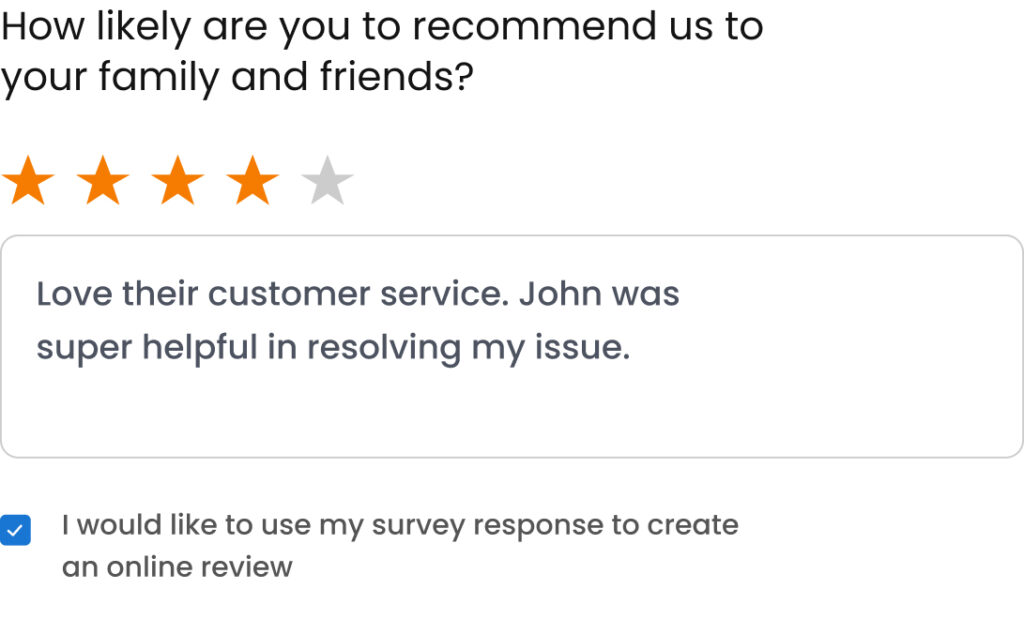
4. Personalize every guest experience
The more tailored the stay, the more memorable it becomes. Use guest data to personalize everything from room preferences to dining suggestions.
- Offer early check-ins or room upgrades to frequent travelers.
- Remember to return guests’ names and preferences to make them feel valued.
Guests who feel seen and cared for are more likely to leave positive reviews and offer contact details and far less likely to voice complaints online.
How Birdeye helped Palmetto Dunes deliver consistent, high-quality guest experiences across every location
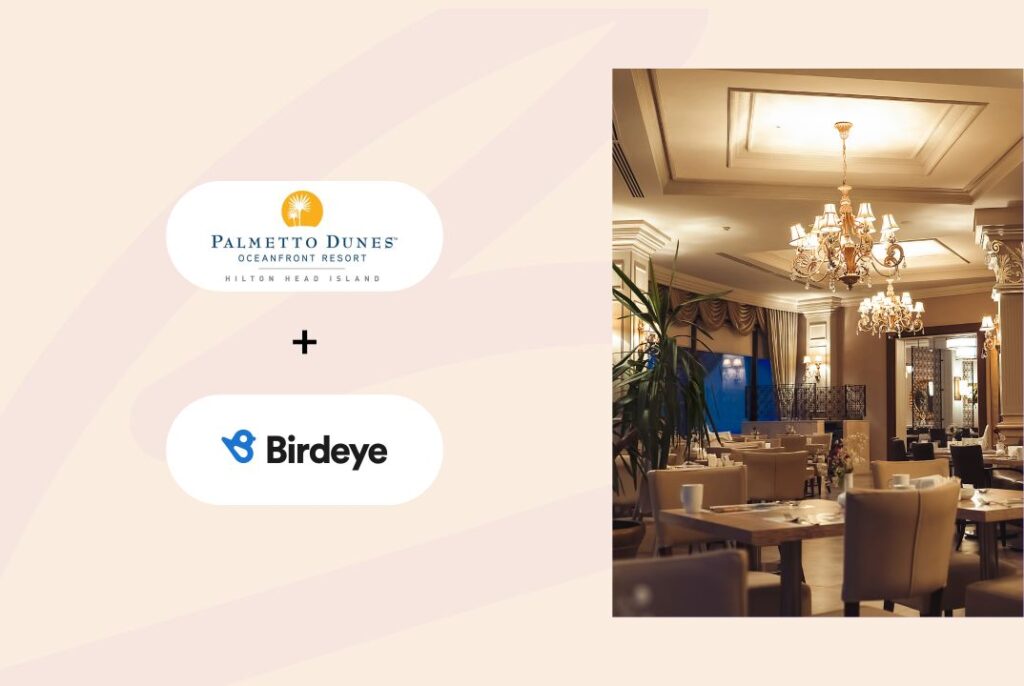
The brand
Palmetto Dunes is a premier destination resort group offering nearly 200 vacation rentals, golf courses, a full-service marina, restaurants, and recreation services across 13 locations. Known for memorable guest experiences and high repeat visits, the brand needed a unified way to manage feedback and service quality across all business lines.
The challenges
Palmetto Dunes needed a simpler way to manage guest experiences across multiple business units with limited staff. Feedback lived in different systems, digital engagement surged during the pandemic, and maintaining consistent service across 13 locations became increasingly difficult.
Key challenges included:
- Scattered reviews and no centralized visibility
- Limited bandwidth to monitor or respond quickly
- Rising need for digital-first communication
- Inability to hire more staff
- Difficulty maintaining consistent guest experience across rentals, golf, dining, and marina operations
They needed one platform that integrated easily, streamlined communication, and supported high-volume digital engagement, similar to how enterprise teams rely on sms marketing for realtors and other modern workflows.
The results
Birdeye helped Palmetto Dunes unify guest communication, streamline responses, and improve service consistency across all locations.
Key outcomes included:
- Centralized feedback: One dashboard for reviews and guest interactions
- More reviews: Automated requests boosted review volume instantly
- Quick issue resolution: Ticketing enabled fast follow-up on negative feedback
- Stronger decisions: Insights revealed trends and improvement areas
- Competitive edge: Benchmarking kept them ahead of nearby resorts
“We looked at a lot of tools, but Birdeye was the only solution that helped us manage online reputation and guest experiences across all our locations. Their open API made integrating with our business systems very easy. Birdeye’s deep reporting and insights is imperative to our business needs.”
Erica Sheets, Digital Marketing Manager at Palmetto Dunes
With Birdeye, Palmetto Dunes strengthened guest satisfaction and operational consistency across every business line.
Learn more about Birdeye and Palmetto Dunes case study
Master hotel review management with Birdeye Agentic AI
Birdeye stands out as a trusted enterprise solution for hotel online review management. With multi-location global brands and 3,000-plus integrations, it supports the complex needs of multi-location hotels that require consistent visibility, accurate listings, and fast guest feedback workflows.
Unlike traditional review management tools, Birdeye is an agentic marketing platform built for independent hotels, large resort groups, and global hospitality chains. It unifies reviews, listings, messaging, surveys, social, and AI search visibility in one system so teams can operate at scale with ease.
Birdeye positions hotels to lead in guest experience and reputation growth. Here’s how it empowers the hospitality industry to take complete control of its online reputation and turn guest feedback into long-term value:
- With BirdAI, hotel owners can actively manage customer experience by summarizing hundreds of reviews in seconds—instantly revealing what delights guests and what needs attention. This builds guest engagement, strengthening your hospitality business and customer relationships.
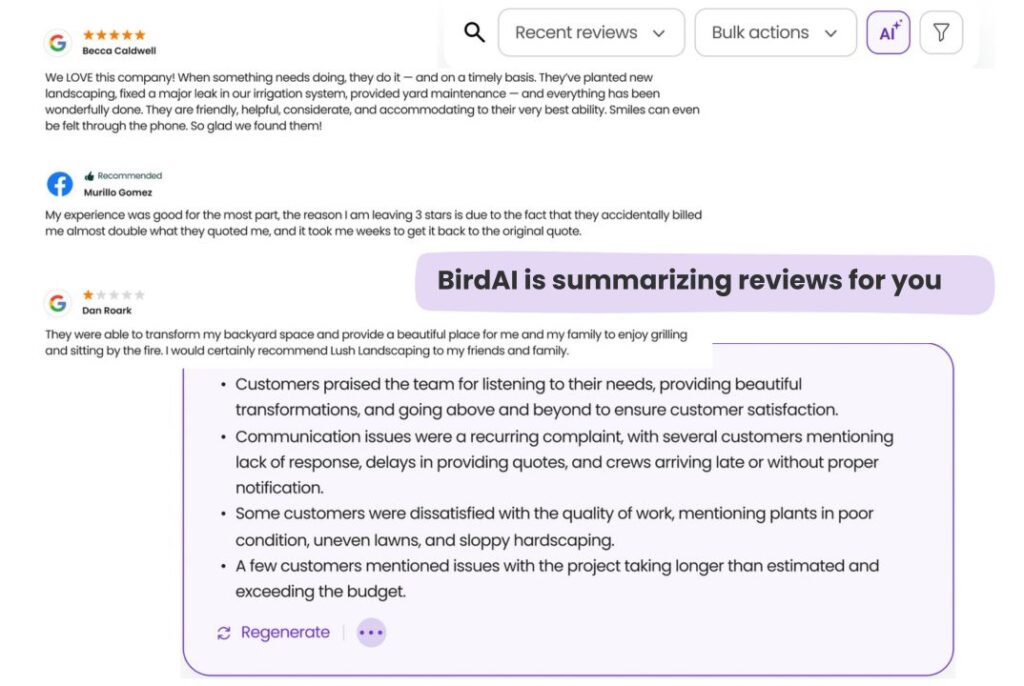
- Birdeye Listings AI keeps your hotel’s information consistent across major directories and review platforms by automatically correcting errors, filling in missing details, and removing duplicates. The Birdeye Listings Optimization Agent continuously scans and updates citations to improve local SEO visibility and ensure travelers always find accurate, up-to-date information about your property.
- Birdeye Competitors AI gives hotels a clear view of how they stack up against local and global competitors by tracking ratings and trending guest sentiment. The Birdeye Reporting Agent turns complex performance data into simple, actionable insights, helping your team spot competitive strengths, uncover gaps, and identify winning opportunities to differentiate your brand.
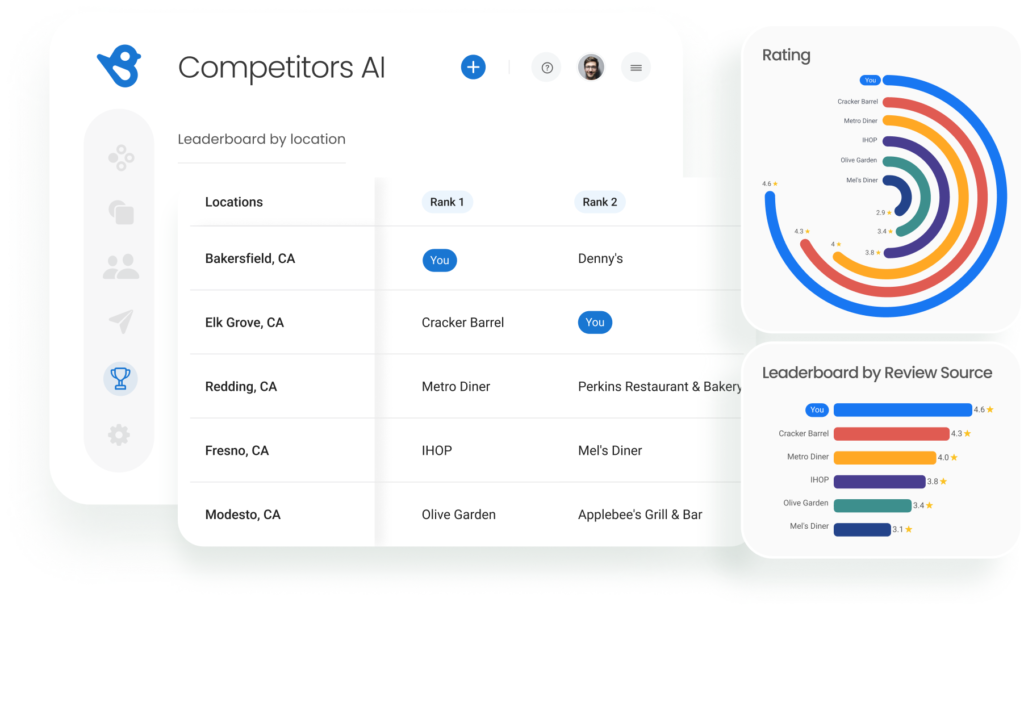
- Multi-location support allows corporate and regional managers to oversee performance across all properties from a single, centralized dashboard. This unified visibility helps maintain brand consistency while empowering local teams with relevant data.

- Birdeye Review Generation Agent: Finds the best message and channel for each guest and automatically sends review requests at the right moment.
- Birdeye Review Response Agent: Writes smart, personalized, on-brand responses by analyzing sentiment, urgency, and any guest-uploaded images.
Together, these tools allow hotels to deliver fast, consistent, high-quality engagement across every review site, the key to maintaining a strong online presence and modernizing your hotel review software strategy.
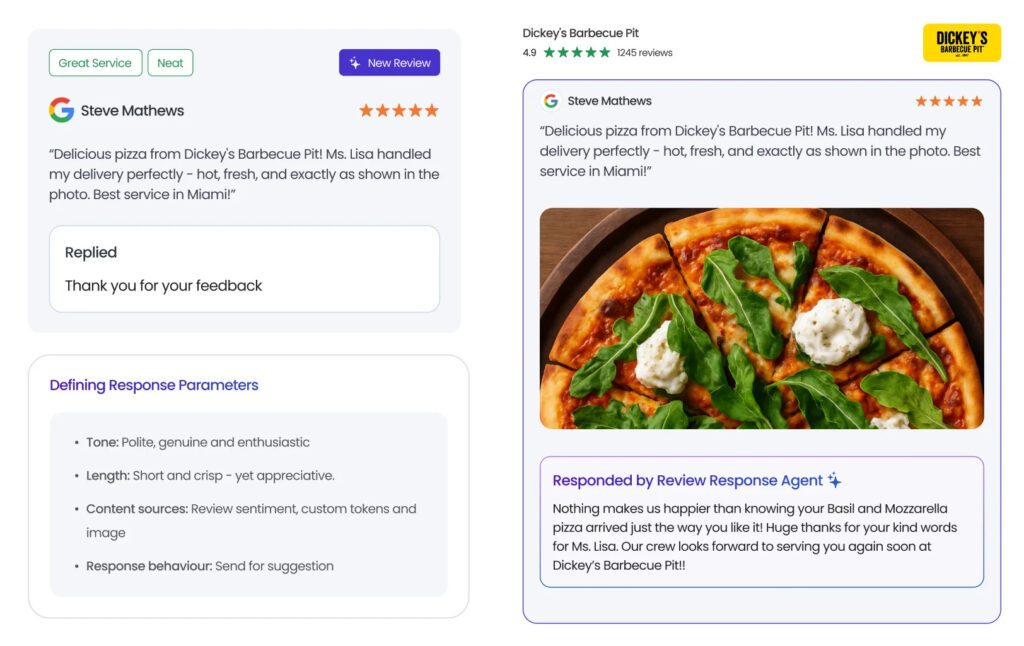
Responding to every review is essential, but combining timely responses with a steady flow of new feedback creates real momentum. With the right technology in place, your team can serve future guests even better and build a reputation that stands out in a competitive market.
No matter your hotel’s size or structure, Birdeye simplifies complex review management workflows. It enables your staff to work smarter, not harder—delivering better guest experiences, driving more positive feedback, and building a stronger, more profitable reputation.
In a world where guest trust is everything, Birdeye ensures you earn and keep it.
FAQs about hotel review management
It’s a platform that helps you monitor, respond to, and analyze reviews across multiple channels to enhance your hotel’s reputation and guest experience. The right hotel review management software, like Birdeye, centralizes feedback, streamlines responses, and strengthens overall hotel review management for every property.
Automate review requests using post-stay surveys, personalized emails, and use Birdeye Reviews AI to prompt satisfied guests to share their experiences. This approach helps you improve hotel reputation while supporting scalable hospitality review management across locations.
Even one poorly handled review can influence future guests, impact your ADR, and lower your review score across platforms. Proactive hotel review monitoring helps you catch issues early and respond before they affect bookings.
The best time to ask for a review is immediately after a positive customer experience, at checkout, or within 24 hours of departure. Platforms like Birdeye automate this perfectly and give hotels an easier path to improve their reputation at every touchpoint.
Look for solutions that offer automation, real-time alerts, AI-powered analysis, and support for multiple properties, such as Birdeye’s full suite BirdAI. Hotels often prefer hotel review software that unifies messaging, analytics, and hospitality review management into a single system.
Final thoughts: A smarter approach to hotel review management
Online reviews are the modern traveler’s compass. Whether you welcome first-time visitors or loyal return guests, your ability to manage, respond to, and learn from reviews will define your hotel’s success in 2026. A strong hotel review management solution backed by automation helps you move faster and stay ahead.
By implementing effective online reputation management strategies and investing in tools like Birdeye’s GenAI suite, you can improve your guest satisfaction, win more bookings, and future-proof your hospitality business in a competitive market.
It’s time to stop reacting and start leading. Let Birdeye show you how to improve your hotel reputation and attract more guests. Watch a demo now.

Originally published
![[Feature image] Hotel review management](https://birdeye.com/blog/wp-content/uploads/Feature-image-Hotel-review-management-1140x596.jpg)

